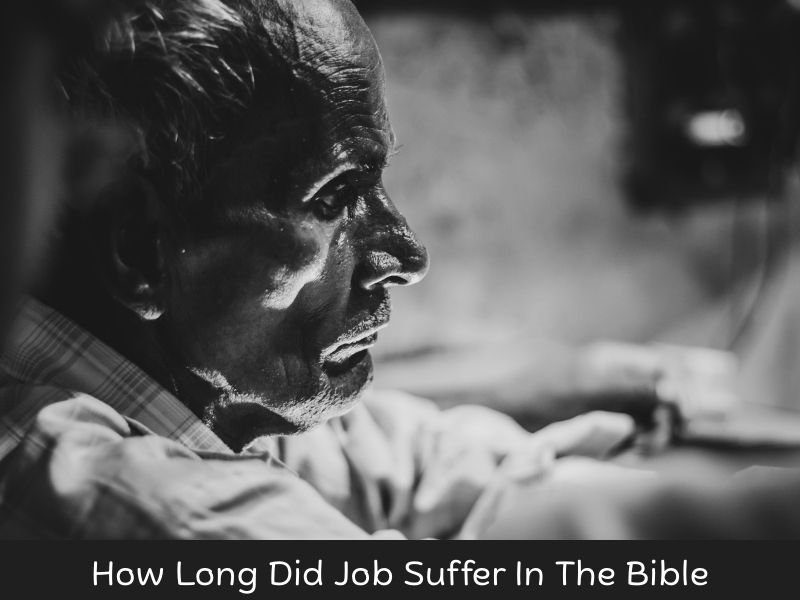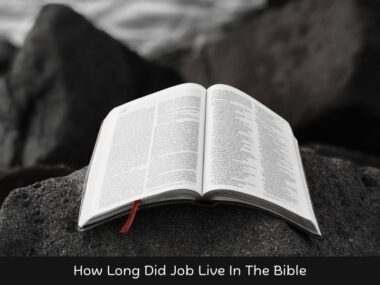How Long Did Job Suffer in the Bible? It’s a question that has crossed the minds of many who’ve read his story—was his pain over in a few days, or did it stretch on for months, even years? The Book of Job is one of the most powerful and poetic books in the Bible, and at its core is a man who lost everything yet never lost his faith. His suffering wasn’t just physical—it was emotional, spiritual, and deeply personal.
Understanding the timeline of Job’s suffering isn’t as straightforward as it might seem. The Bible doesn’t give us a clear number of days, but if we dig into the text, pay attention to context, and explore how scholars interpret the clues, we can begin to piece together the likely duration of his trials.
In this post, we’ll walk through what the Bible tells us about Job’s experience, explore the historical and cultural backdrop, and take a closer look at how long his suffering may have lasted—and what we can learn from it today.
How Long Did Job Wait On The Lord
The Bible does not specify exactly how long Job suffered, but we know it lasted at least several days and possibly much longer. Job’s friends sat silently with him for seven days (Job 2:13), which was after they had already heard of his tragedy, coordinated their visit, and traveled to see him—events that would have taken additional time. Following this, Job and his friends engaged in lengthy dialogues (Job 3–37), then God responded out of the storm (Job 38–41), and finally, Job’s friends made sacrifices, and Job prayed for them (Job 42). Job 7:3 mentions “months of futility,” which may indicate literal months of suffering or simply express how drawn-out and agonizing time felt to Job.
The duration of Job’s suffering is uncertain due to many unknowns—travel times, the pacing of the dialogues, and the timing of God’s intervention and restoration. If events happened in rapid succession, Job’s suffering might have been just over a week, but if there were delays, it could have lasted for months. Regardless of the actual timeline, Job’s endurance remains profound. His patience amid suffering serves as a powerful model of faith, and his story reminds us that God’s blessings and glory often come after enduring trials (James 5:11; Romans 8:18).
Overview of Job’s Trials
To understand how long Job suffered in the Bible, we must first understand the breadth of his suffering. Job was a wealthy man who lived in the land of Uz, known for his integrity and righteousness. The biblical account in Job 1 describes how Satan challenged Job’s faith, proposing that Job’s loyalty was due to his prosperity. With God’s permission, Satan unleashed destruction on Job’s life.
Job lost his livestock, his servants, and tragically, all of his children in a single day. As if this weren’t enough, his health was stripped away. In Job 2:7-8, we see Job sitting among ashes, scraping his sores with broken pottery. His suffering was physical, emotional, and spiritual. Job’s wife urged him to curse God and die, while his friends arrived not with comfort but with accusations and long-winded discourses.
When considering how long Job suffered in the Bible, it’s crucial to account for the intensity and breadth of his pain. These were not fleeting moments of hardship but sustained, deeply personal losses that devastated every aspect of his life. The narrative emphasizes not just Job’s external losses but also his internal struggle with confusion, despair, and unrelenting questions about divine justice.
When asking how long Job suffered in the Bible, one must begin with a full appreciation for what Job suffered. Only then can we measure the possible period these events covered?
Biblical Indicators of Time
To find clues about how long did Job suffer in the Bible, one must carefully study the scriptural indicators of time embedded in the poetic structure of the book. Though the narrative is not structured around dates or years, certain verses provide invaluable insight.
In Job 2:13, Job’s three friends sat with him on the ground seven days and seven nights without speaking a word, seeing that his grief was very great. This initial silence suggests a period of profound mourning and is a direct clue in understanding how long did Job suffer in the Bible. However, this was just the beginning of their extended dialogue, which spans over 30 chapters.
Another time clue appears in Job 7:3, where Job declares, “So I have been allotted months of futility, and wearisome nights have been appointed to me.” This verse is among the most direct references when determining how long did Job suffered in the Bible. The use of “months” rather than “days” or “weeks” implies a sustained period of suffering—not a brief episode, but an enduring trial that stretched over many weeks or even longer.
Job 29:2 also provides a glimpse into the before and after of his affliction: “Oh, that I was as in months past, as in the days when God preserved me…” Again, the word “months” hints that his affliction was not just a short-lived crisis but a prolonged ordeal.
So, when we pose the question—how long did Job suffer in the Bible—we see that even the text points toward a multi-month time frame. This duration supports the weightiness and depth of Job’s lamentations, his spiritual questioning, and his emotional exhaustion.
Scholarly Interpretations
While the Bible gives poetic indicators, scholars have offered varied opinions to answer: how long did Job suffer in the Bible? Some scholars believe Job’s suffering lasted several months, based on his references to “months of futility.” Others estimate a longer duration—potentially up to a year or more—when accounting for the detailed dialogues, the cultural customs of mourning, and the time required for Job’s eventual restoration.
Biblical commentators like John Gill and Matthew Henry suggest that Job’s sufferings could have spanned several months to a year, particularly when considering the comprehensive discourses between Job and his friends. When evaluating how long did Job suffer in the Bible, the scale and tone of these discussions imply a duration too lengthy to be contained within mere weeks.
Modern scholars also consider the literary structure of the book. The dialogues and monologues are not quick exchanges but elaborate expressions of sorrow, rebuke, hope, and revelation. If one takes these speeches as metaphorical reflections of actual experiences, the timeline extends naturally. Thus, to answer “how long did Job suffer in the Bible?”, scholars lean towards a time span of no less than several months and possibly more.
Theologians also remind us that the question—how long did Job suffer in the Bible—is not merely historical. It is also theological. Time, in this context, serves not just as a measure of pain but as a framework to understand endurance, divine silence, and eventual redemption.
Literary and Theological Perspectives
The Book of Job is written in a poetic and dialogic structure, and this literary form plays a significant role in how we interpret the events within it. Unlike historical narratives such as Genesis or Kings, Job’s story unfolds through a series of speeches, lamentations, and divine responses. This structure allows for deeper emotional exploration, but also makes it more challenging to extract a concrete timeline.
Many theologians interpret the poetic nature of Job as symbolic rather than strictly chronological. This perspective adds complexity to the inquiry of how long Job’s suffering lasted. For instance, the cycle of speeches between Job and his friends could represent either literal conversations or metaphorical expressions of ongoing emotional and spiritual wrestling.
In a theological context, the duration of Job’s suffering isn’t just a matter of days, weeks, or months—it’s about the process of transformation. Job begins as a man with unquestioned faith and ends with a deeper, more humbled understanding of God’s sovereignty. This journey, though measurable in time, is also measured in spiritual growth. The central question, therefore, is not only how long Job endured pain, but how that endurance reshaped his relationship with God.
The theology of suffering in Job also informs broader Judeo-Christian thought. His story is often cited in sermons and teachings to highlight the mystery of divine justice and the importance of faith during trials. When people ask how long Job suffered, they are often asking a deeper question: “Why does God allow prolonged suffering?” and “What purpose does pain serve in the life of the faithful?”
The conclusion of the book—with Job’s fortunes restored and his life extended—signals not just an end to his temporal suffering but also a divine vindication of his faith. Thus, how long Job suffered becomes less about the calendar and more about the arc of redemption.
Comparative Analysis
To better understand the implications of Job’s suffering, it is helpful to examine his story within the context of other ancient literature and cultural practices. In the ancient Near East, suffering and divine testing were common themes across various cultures. Literature from Mesopotamia, Egypt, and Canaan also contains narratives in which righteous individuals endure hardship as a means of spiritual proving or cosmic balance.
In the Babylonian “Ludlul-Bel-Nemeqi” (translated as “I Will Praise the Lord of Wisdom”), the protagonist also suffers inexplicably, crying out to the gods and receiving no immediate answer. This literary parallel suggests that Job’s story fits into a broader tradition of ancient reflections on the human condition. These narratives, like the Book of Job, rarely focus on exact durations, emphasising instead the internal journey of the protagonist.
Job’s cultural setting also gives insight into mourning practices and expectations. In ancient Semitic cultures, mourning could last for extended periods, often up to seven days for close family and significantly longer for catastrophic loss. Given Job’s loss of ten children and all his wealth, it would not have been uncommon for the mourning process to extend for several months, aligning with his references to “months of emptiness.”
From a modern perspective, comparing Job’s endurance to contemporary experiences of grief and illness provides relatable insights. Chronic illness, for instance, often follows an arc of despair, questioning, and acceptance, similar to Job’s narrative arc. Thus, how long Job suffered in the Bible reflects a timeless human experience, echoing through personal loss, psychological trials, and spiritual searching.
The question becomes not just historical or theological but deeply existential. How long does anyone suffer when answers are unclear and relief seems distant? In that light, the Book of Job serves as both a historical account and a universal parable.
Conclusion
As we draw this study to a close, it is important to summarise the insights that help us answer the central question: How Long Did Job Suffer In The Bible? Though the exact number of days or months is not explicitly stated in scripture, several verses offer crucial clues. The use of “months” in Job’s own words, the week-long silence of his friends, and the detailed cycles of speeches point toward a suffering period that lasted multiple months, if not longer. Scholars and theologians differ in their estimations, but most agree that Job’s suffering was not brief. It was drawn-out, intense, and deeply transformational.
His pain was not just physical but emotional and spiritual, touching every part of his life. That transformation was ultimately crowned with restoration, as God returned Job’s fortunes and granted him a long life filled with renewed joy and family. The literary structure of the Book of Job further emphasises the slow unfolding of his trial and growth. Unlike quick resolutions in modern storytelling, Job’s redemption comes after prolonged introspection, confrontation with friends, and divine engagement.
This slow rhythm reflects real-life suffering, where answers and relief rarely come quickly. In theological terms, the duration of Job’s suffering symbolises a divine mystery. It teaches readers that endurance through unexplained pain can lead to deeper understanding and greater blessing. It also reminds us that timelines are often secondary to spiritual outcomes.
So, while we may not know the exact number of days Job suffered, we can confidently say that his experience spanned several months at least, filled with profound suffering and, ultimately, divine restoration. The question—How Long Did Job Suffer In The Bible—thus remains as relevant today as it was thousands of years ago, continuing to inspire those who walk through their seasons of affliction.







